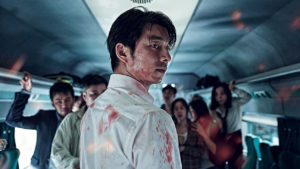 Missed Madison Film Festival
Missed Madison Film Festival
Train to Busan | Yeon Sang-ho | Korea | 2016 | 118 minutes
Amazon Video | Google Play | iTunes | Vudu
Erik Oliver suggests that Yeon Sang-ho’s Train to Busan injects the well-worn zombie sub-genre cycle with much needed vibrancy.
Edit 2/23/17: Train to Busan did not miss Madison after all. WUD Film screens it tonight and Saturday (February 25) at the Union South Marquee Theater.
It’s safe to say that zombies have worn out their welcome. By now, stories about the undead attacking seem arbitrary, chasing a zeitgeist that barely exists anymore. Yet with Yeon Sang-ho’s Train to Busan, zombies seem not just acceptable, but vibrant.
After an intro that leans heavily into hokeyness (and introduces some of the film’s low-key political subtext), we meet Seok-Woo (Gong Yoo), a divorced businessman who prioritizes deals over his lonely daughter, Soo-an (Kim Su-an). Disappointed by Seek-Woo’s inattentiveness with her birthday coming up, Soo-an just wants to take the train to Busan, where her mother lives. Seok-Woo grudgingly agrees to take the train with her. Unfazed by what seems from a distance to be city riots, they board, neither one happy with the other.
As the train takes off, a woman with an infected bite on her leg jumps aboard, and undergoes a rapid transformation into a cannibalistic, mindless creature. As she begins to attack the train’s crew, the infection spreads, and soon Seok-Woo and Soo-an are pressed into a race for survival against the onrush of zombies heading roughly from one end of the train to another. As reports arrive that Busan is a rare fortified haven from the outbreak, they become more and more determined to reach their destination, while strengthening their bond in order to survive that long.
Sketching this framework lightly, so as not to bore us with the familiar, Yeon builds out an impressively kinetic and emotional film, considering the tight quarters in which it takes place. Zombie films tend to take place in enclosed spaces (see the progression of George Romero’s initial Dead trilogy: house, shopping mall, compound), but Train to Busan ups the game by taking place in possibly the most enclosed, limited space. Using the linearity of the train to measure the step-by-step advancement of the zombie horde, he’s able to clearly pace the film by degrees of threat, and, particularly as juxtaposed with the speed of the train’s exterior travel to Busan, he highlights time stressfully, consistently keeping the tension high.
Yeon also brings a lightness of touch and a constant movement that keeps the film, for all its carnage and emotional devastation, more fun than genuinely harrowing. His style is often more Shaun of the Dead than George Romero. Train to Busan carries on the tonal fluidity and gleeful absurdity that characterizes much of the South Korean New Wave, and those elements work beautifully with the hokey-but-harrowing zombie premise. When infected, characters flop around, stumbling into others like intoxicated cartoons; the zombies themselves are rabid, demonic entities rushing for you, but they can’t even figure out how to open a door. Train to Busan, for as intense as its setup is, continually keeps us engaged by reminding us that this is a bit ridiculous.
While the film does lean into wackiness and melodrama, it also understands that its heightened tone requires an emotional center, and Train to Busan is populated with small arcs and stories that lend it a greater weight. Seok-Woo and Soo-an’s relationship serves well as an anchor, giving us a fairly traditional redemption arc that nonetheless leans satisfyingly and unusually heavily on Seok-Woo’s irrepressible oafishness.
As they get closer, Train to Busan also weaves in several smaller stories: pregnant Seong-kyeong’s (Jung Yu-mi) fight, in the face of her vulnerability, to protect her hot-headed husband Sang-hwa (Ma Dong-seok); a team of high school baseball players, dealing with their own complex hormone-fueled dramas; elderly sisters In-gil (Ye Soo-jung) and Jong-gil (Park Myung-sin); and the mind-blowingly selfish CEO Yon-suk (Kin Eui-sung), who becomes the film’s de facto villain. Each of these characters are types, but the actors are game enough, and the script’s emotions bold enough, that each becomes vivid and sympathetic (or vile) enough to maintain our investment. Train to Busan is often operatic, forgoing nuance for grand gestures, but those gestures are always motivated enough that the film’s overall absurdity doesn’t overwhelm its human element.
Train to Busan doesn’t break ground in any way, but it’s a refreshingly arch take on a tired genre, and it packs enough of an emotional punch to transcend empty spectacle. Still, despite its simultaneously heavy-handed and thin political subtext, involving a bureaucratic failure to prevent nuclear leakage, Train to Busan is just fun. Chaotic and occasionally distraught fun, but in times like these, that’s valuable enough.
Check out the other Missed Madison Film Festival reviews for Friday, January 27:
The Intervention reviewed by Vincent Mollica (WUD Film Starlight Cinema) at Madison Film Forum»
HyperNormalization reviewed by James Kreul at Madison Film Forum»